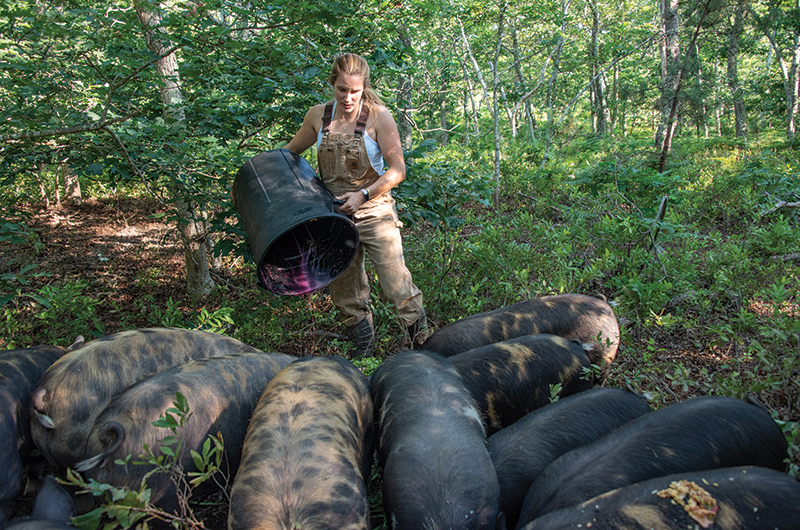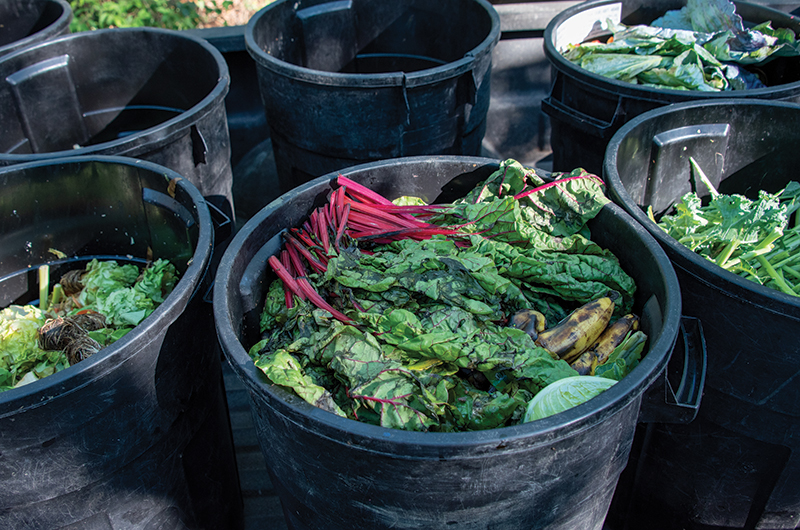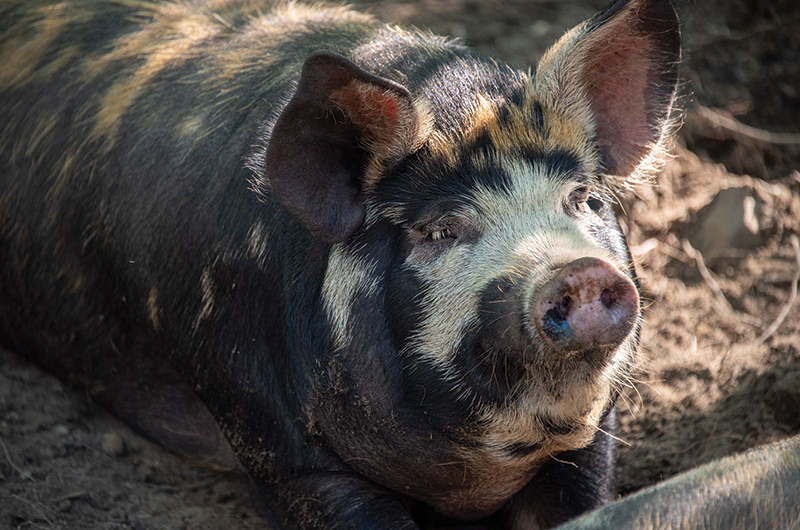On a golden July afternoon, 13 healthy, stout pigs called out to their farmer, Jo Douglas, with grunts, grumbles and squeaks as she arrived with barrels of restaurant kitchen waste to serve up supper. As friendly and intelligent as dogs, the pigs wanted to greet Jo and check out the visitors with her, but nevertheless were loudly insistent on being fed.
Jo stepped over the low electrified fencing to mingle with the pigs and hogs (those over 120 pounds), greeting each one with a rub on the rump, nearly getting knocked over as she squatted down to their level. The cacophony was ceaseless as the pigs rolled from one side of the dirt clearing to another, keeping an eye on their Jo as she hauled nine garbage cans full of waste from her truck.
This summer Jo will be picking up scraps from 20 restaurants, mostly down-Island, which seems like nothing compared to picking up from 50 restaurants last summer, when she drove about 60 miles a day and fed four times as many pigs. Jo, who is 28, still works full days seven days a week like most farmers, but since the pigs are already pre-sold to the restaurants that supply their food, she can enjoy some satisfaction in her own one-woman farm business, Fork to Pork.
Jo tosses the barrels of waste out on to a pile in the brush, and the pigs turn their attention to eating. The barrels contain fresh food waste, with lots of vegetable scraps, stale bread, doughnuts, pasta – all food that restaurants would have to pay to have taken away.
These days, Island Grown Initiative’s composting program does rescue more and more food waste, but the 180 gallons (minimum) that Jo pulls out of the waste stream every day is no small contribution to the Island's efforts to send less trash off-Island, where it lands at a landfill/incinerator facility. Jo’s pigs gain a pound of weight a day, and by September she will be filling her truck with 15 barrels of food waste to keep her hogs fed.
For Fork to Pork, Jo chose a breed of pig called an Idaho Pasture Pig, a combination of Berkshire, Kunekune and Duroc breeds. The breed grows quickly and nicely on a diet of grazing and scraps and yields tender and tasty meat — especially when fed as well as these pigs.
The benefit for the chefs who use the Fork to Pork service is twofold: First, the restaurant’s food waste is picked up daily by a pleasant, dedicated young farmer who takes wonderful care of her animals. Secondly, those animals will become a delicious (and local) part of the restaurant’s menu after they are slaughtered.
In the fall, Jo will deliver the slaughtered pigs to Island restaurants like The Covington, Nomans, Alchemy, Black Sheep and Scottish Bakehouse, where each chef will do their own butchering. Jo says that chefs and wait staff love to praise the pork, and tell the story of the Island pigs that are fed with restaurant’s scraps.
When the pandemic came along this spring, Jo had to calculate the risks in planning for this summer. She would need to start caring for piglets without knowing if the restaurants were even going to be open. In the end, she decided to scale down her operation from last summer by purchasing only 13 piglets, and importantly, castrating the males. (Last summer she learned the lesson that female pigs can get pregnant at four months. Seven sows turned the number in her drove of pigs from 30 to 55.)
At the end of April when she got her piglets, she set up at Pat Ingalls’ horse farm in Oak Bluffs. The farm has worked out well because Jo can easily move the pigs as they outgrow an area. Right now they’re fenced into about an acre of woods that is plenty of space for them to stay clean and entertained by rooting around and clearing brush. Soon Jo will move them – and their portable shelter and water tank – to another wooded area. She doesn’t worry about the animals escaping, because they have everything they want in their small area: each other, shelter and water, food arriving daily, and plenty of brush to keep them busy.
Jo is lucky and she knows it. She is grateful for how satisfying her life is.
“Having this farm checks off so many boxes for me,” she said. “I’m my own farm manager and can make my own decisions – structuring my own time, caring for my own animals and creating high quality food by picking up waste.
“I’m social, and don’t want to work alone all the time, so interacting with the chefs and kitchen staff is fun for me too,” she added. “And I like being able to hang out with my pigs as much as I want.”
Like many Islanders, Jo needs to work several jobs to keep things going. She is a year-round coach at CrossFit and has coached both varsity lacrosse at the high school and the girls JV ice hockey team at the Martha’s Vineyard Ice Arena. She’s also worked in their pro shop and as their first female Zamboni driver. (Yes, she said, it is a lot of fun to drive the Zamboni!)
Jo, who has a degree in Sustainable Agriculture and Animal Science from Green Mountain College in Poultney, Vermont, credits her CrossFit training and coaching with keeping her fit to do the farm chores.
When Jo entered college, she had been a vegetarian since the age of 10. But when she began to learn how the by-products of slaughtering animals, like bone meal and blood meal, become fertilizer for vegetable fields, she realized we are often indebted to animals for our food, even if we do not recognize it.
“I would rather be fully conscious and aware of how my eating choices impact an animal’s life then to pretend that it doesn’t exist,” she said.
While Jo still doesn’t eat a lot of meat, she’s come full circle in her thinking about it.
“I didn’t eat meat at all, and now I’m raising animals for meat. Before I could eat meat, I wanted to be able to raise the animals and slaughter them, to participate fully,” she said.
“People eat meat,” she added. “I would rather that people eat meat from animals that have been raised humanely and are healthy. Someone has to do that, and that’s what I’m doing here.”
The season will wrap up in November when Jo makes a thoughtful and grateful trip to the slaughterhouse using her truck and trailer (her only capital investments) to haul the pigs.
At that point, Jo said, “I’ll be able to say I’ve invested my heart and energy and labor in raising these pigs in a good way. I thank them. May we all be so lucky as to serve a purpose in our life. These pigs have one bad day, but for six, or eight or 10 months, they have a good life.”
Emily Meegan lives in Chilmark and works at the West Tisbury Public Library.















Comments